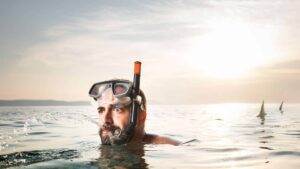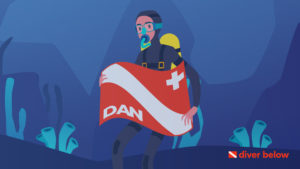When it comes to warm and tropical locations for scuba diving, the Maldives is one of the best places to go.
This is a relatively large archipelago that comprises over 1,200 islands, with less than 20% of those islands being inhabited.
This may be a very remote destination in the middle of the Indian Ocean, but due to the diversity of sea life and the many scuba diving sites, it has become one of the world’s most popular dive locations.
There are nearly 30 different coral islands, reefs, and atolls in the Maldives which can be dived.
Let’s discuss some of the most important things you need to know about scuba diving in the Maldives. Read our Maldives scuba diving guide to find out more.
Contents
Expected Conditions and Best Times to Dive
Many people enjoy diving in the Maldives because it is a tropical climate where air and water temperatures are relatively warm year-round.
You can expect it to be anywhere from 80° to 86° Fahrenheit (26° to 30° Celsius) in terms of the water temperature.
As you can tell, even on the cooler end of this spectrum, this is still very warm.
Another reason diving in the Maldives is popular is that the water is extremely clear.
You can expect a visibility range of up to 40 meters (around 130 feet).
Diving in the Maldives between May and July is not recommended because water visibility is the lowest.
If you like the warmth, the best time will be between January and April, as these are both the warmest and driest months.
However, if you plan on seeing large sea creatures such as whale sharks and manta rays, the best months are between August and November.
How to Dive the Maldives
What is really cool about scuba diving in the Maldives is that there is something available for everybody.
There are over 130 resorts, and the majority cater to scuba divers.
Moreover, you can find specific scuba diving hotels that are as cheap as $150 per night.
However, there’s no reason why you cannot go for all the bells and whistles and pay upwards of $5,000 per night.
Whether you want to go on a guided diving day trip or travel and dive from a liveaboard, these options are both available in the Maldives.
Take one of the many guided day diving trips to various drift dives, wrecks, and reef dives that are all available. There are also a variety of lagoons.
Some of the highest-rated dive resorts include Banyan Tree Vabbinfaru and the Park Hyatt Maldives Hadahaa.
Some of the highest-rated liveaboards include the Maldives Grandezza and the Nautilus One.
Keep in mind that these liveaboard trips can cost you between $150 and $1,500 per day, depending on the boat and trip.
Marine Life You May Encounter
Because the Maldives features warm and tropical water with consistent temperatures year-round, it is a great place to see large marine animals.
Some of these larger animals may be elusive but depending on the time of day and the tide, you should see various large and unique sea creatures.
Some of the creatures you can see while scuba diving include whitetip reef, hammerhead, leopard, and whale sharks, eagle rays, manta rays, stonefish, hawksbill turtles, loggerhead turtles, common dolphins, seahorses, schooling fish, and more.
Best Dive Locations in the Maldives
As mentioned before, many different sites in the Maldives are ideal for divers of all skill levels.
Let’s look at some of them.
Vaavu Atoll
If you want to go channel diving, the Vaavu Atoll is one of the best places to go, with the Fotteyo Kandu channel featuring many cool overhangs and caves to explore.
This is often noted as being one of the world’s best dive sites.
Feeling Adventurous?
Vaavu Atoll is a great place for cave diving. While this type of diving comes with its own set of risks, very few have seen the beauty from inside the caves in this region.
Ari Atoll
This is one of the most popular dive locations in the Maldives, home to a few of the best scuba sites.
If you go to Maaya Thila and dive after sundown, you will likely see reef sharks in the middle of a feeding frenzy.
Fuvahmulah Atoll
If you want to see many different kinds of rare sharks such as thresher, tiger, and whale sharks, as well as hammerhead sharks, this southerly atoll is the place to dive.
However, this site is not for beginners.
Wrapping Up
This has been a very brief overview of the basics of scuba diving in the Maldives.
However, diving here won’t disappoint, and you’ll likely experience the dive trip of a lifetime.




